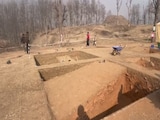Delhi's long battle with its garbage mountains may soon see relief. The Municipal Corporation of Delhi (MCD) has cleared plans to set up four new solid waste processing plants aimed at ensuring that fresh waste is no longer dumped at the city's overburdened landfill sites.
The upcoming facilities, to be built at Bhalswa, Singhola, Narela-Bawana, and Okhla, will have a combined capacity of 5,100 metric tonnes per day (TPD) and come at an estimated cost of Rs 361.42 crore. Once operational, officials say, these plants could process all of Delhi's newly generated waste, significantly easing pressure on landfill sites that have long towered over the city's skyline.
Mayor Sardar Raja Iqbal Singh said the proposals have been approved and tenders have been floated for construction.
"With the commissioning of these facilities, fresh waste generated daily will not be dumped at landfill sites," he said.
Bridging Delhi's Waste Gap
Delhi currently generates about 11,500 tonnes of municipal solid waste every day, but its four existing waste-to-energy plants at Narela–Bawana, Okhla, Tehkhand, and Ghazipur can handle only 6,550 tonnes. The remaining 4,700 tonnes ends up at three landfill sites-Ghazipur, Bhalswa, and Okhla, which have become major environmental hazards.
The new plants are designed to fill this gap. The MCD plans to build units at Bhalswa (1,800 TPD), Singhola (700 TPD), Okhla (1,400 TPD), and Narela–Bawana (1,200 TPD), with work expected to be completed in about six months.
Clearing the Legacy Waste
To make space for the new facilities, the MCD has been carrying out biomining, a process that removes legacy waste and reclaims land at dumpsites. So far, around 25 acres have been reclaimed at Bhalswa, 10 acres at Okhla, and 7.2 acres at Singhola. Another 10 acres have been earmarked for an integrated waste facility at Narela–Bawana.
Officials said these steps are part of a larger effort to achieve "scientific disposal" of solid waste and align with the Swachh Bharat Mission's goal of cleaner cities.
Will It Be Enough?
While the expansion marks a major policy step, experts say success will depend on sustained implementation, waste segregation at source, and accountability in operations. Delhi's landfills currently hold an estimated 280 lakh tonnes of legacy waste and continue to emit toxic gases affecting nearby communities.
Mayor Singh said the civic body remains committed to closing this chapter.
"There will be no accumulation of fresh waste at landfill sites once these plants are operational," he said.
If the plan stays on track, the new facilities could mark a much needed turning point in Delhi's waste management story. But after years of missed deadlines and overflowing dumps, the question remains that can the capital finally turn its garbage crisis around?















